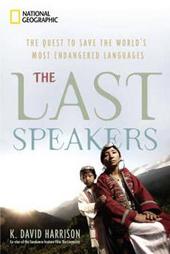
|
The Last Speakers
Hardback
Main Details
| Title |
The Last Speakers
|
| Authors and Contributors |
By (author) K. David Harrison
|
| Physical Properties |
|
| Category/Genre | Language - history and general works |
|---|
| ISBN/Barcode |
9781426204616
|
| Classifications | Dewey:408.9 |
|---|
| Audience | |
|---|
|
Publishing Details |
| Publisher |
National Geographic Society
|
| Imprint |
National Geographic Society
|
| Publication Date |
21 September 2010 |
| Publication Country |
United States
|
Description
Part travelogue and part scientist's notebook, The Last Speakers is the poignant chronicle of author K. David Harrison's expeditions around the world to meet with last speakers of vanishing languages. The speakers' eloquent reflections and candid photographs reveal little-known lifeways as well as revitalization efforts to teach disappearing languages to younger generations. Thought-provoking and engaging, this unique book illuminates the global language-extinction crisis through photos, graphics, interviews, traditional wisdom never before translated into English, and first-person essays that thrillingly convey the adventure of science and exploration.
Author Biography
K. David Harrison is Assistant Professor of Linguistics at Swarthmore College. As a linguist and specialist in Siberian Turkic languages, he has spent many months in Siberia and Mongolia studying the languages and traditions of nomadic herders. Harrison's work includes not only scientific descriptions of languages, but also storybooks, translations and digital archives for native speaker communities. Harrison makes frequent appearances before college, high school, and other public audiences
Reviews"The Last Speakers opens our eyes and hearts to the human realities of language loss. If you plan to read just one book on language this year, make it this one."--David Crystal, author of Language Death "This wonderful book is really three wonderful books wrapped into one: a world travelogue of languages; a moving personal account of the last speakers of vanishing languages; and a revelation of the knowledge tied to each language. Perhaps you're among the many people who think, 'Wouldn't we better off with just a few major languages? Let those thousands of little local languages disappear.' After reading this book you'll know why all those little local languages do matter, and what can be done to save them."--Jared Diamond, Professor of Geography at UCLA and Pulitzer Prize-winning author of Guns, Germs, and Steel and Collapse "Harrison has found new ways of looking at endangered languages, developing the concept of a language hotspot, and so focusing on the kind of interactions that make up a language ecology. This book gives an inkling of the radical ways in which endangered languages may yet inspire and enrich the understanding of people all over the world, and so find a new and nobler value in globalization."--Nicholas Ostler, author of Empires of the Word: A Language History of the World "K. David Harrison is a language warrior, defending the world's linguistic minorities by speaking simply and eloquently of their dilemma--language loss."--Delphine Red Shirt, Oglala Sioux Tribe, lecturer at Stanford University in special languages "What K. David Harrison calls 'landscape awareness' is deeply embedded cultural knowledge that many indigenous peoples, currently residing in their homelands throughout the world, have kept alive for centuries through daily conversation. He is one of the few non-indigenous people to experience it first-hand and to understand it. He articulates it well, in particular, for the Tuvan people and others, to whom he kept his solemn promise to tell people outside their world that they exist and are well. In terms of language loss, many are not doing well, simply due to the fact, as the author eloquently points out, the cultural knowledge encoded in their languages is about survival. When that is lost, how can they survive? This question looms large for the rest of humanity, according to the author. This is a book that should be read by both indigenous and non-indigenous language warriors for the sake of human survival."--Delphine Red Shirt, Oglala Sioux Tribe, lecturer at Stanford University in special languages "This chronicle is as much an homage to noble elders who often struggle to surmount indifference in their own communities as it is an op-ed by the author, who sounds the alarm among a skeptical public, and even other scientists, about the incalculable loss posed by a language's extinction." -The Washington Post
|